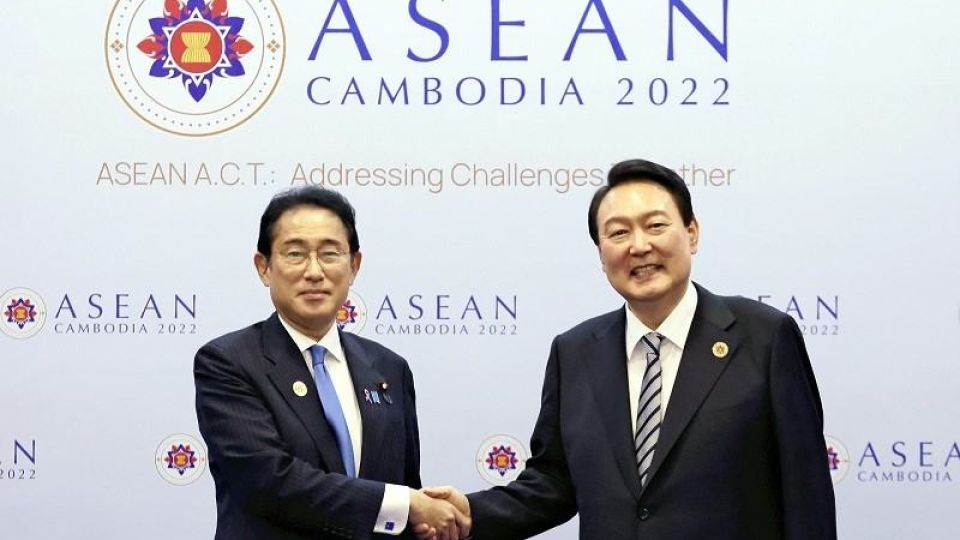November 15, 2022
PHNOM PENH — Prime Minister Fumio Kishida and South Korean President Yoon Suk-yeol on Sunday agreed to seek an early resolution of the issue of former wartime requisitioned workers from the Korean Peninsula at the first formal summit meeting between the two nations in three years.
The roughly 45-minute meeting was held on the sidelines of meetings related to the Association of Southeast Asian Nations in Phnom Penh, where Kishida was visiting as part of his trip to Southeast Asian nations. He also attended a bilateral meeting with U.S. President Joe Biden and trilateral talks with Biden and Yoon. The three leaders reaffirmed their cooperation amid the increasingly severe security environment around China, Russia and North Korea.
In light of accelerated negotiations between diplomatic authorities, Kishida and Yoon agreed to expedite efforts to resolve the wartime labor issue, which has remained a major concern for both countries.
Kishida’s meeting with Yoon was the first formal in-person dialogue between the leaders of Japan and South Korea since December 2019 when former Prime Minister Shinzo Abe met then South Korean President Moon Jae-in.
It is also the first meeting between Kishida and Yoon since the inauguration of the Yoon administration in May.
The two leaders strongly condemned North Korea’s ballistic missile launches as “a critical and imminent threat to the security of the region, including Japan and South Korea, and a clear and serious challenge to the international community.”
They confirmed that there would be close cooperation between Japan and South Korea, as well as among Japan, the United States and South Korea, toward the complete denuclearization of North Korea.
They also confirmed bilateral cooperation toward realizing the vision of a free and open Indo-Pacific, apparently in consideration of hegemonic moves by China.
Kishida said that he will announce a new plan for the vision by next spring. Yoon also explained South Korea’s own Indo-Pacific strategy. Both leaders welcomed each other’s initiatives.
Kishida expressed his sympathy for the victims of the fatal crowd surge in Seoul’s Itaewon entertainment district. Yoon also expressed his sympathy for two Japanese nationals who died in the incident.
Relations between Japan and South Korea in recent years have been described as the worst they have ever been in the post-World War II period.
In 2018, South Korea’s Supreme Court ordered Japanese companies to pay compensation to former requisitioned workers. Currently, preparations are underway to liquidate the assets held by the companies in South Korea after they did not agree to pay.
The Japanese government had previously stated that it would not hold a summit meeting unless there was progress on the issue of former requisitioned workers, arguing the ruling violates international law.
Due to such circumstances, when Kishida had a 30-minute dialogue with Yoon in New York in September, the Japanese government described it as an informal discussion.
Although the details of Sunday’s meeting have yet to be released, Yoon is believed to have explained the current state of the issue.
North Korea has repeatedly conducted missile launches, including one involving a ballistic missile that flew over Japan, raising fears that Pyongyang may conduct a nuclear test. The Japanese government is believed to have decided to hold a formal summit meeting this time because of the need for Tokyo and Seoul to show solidarity.

